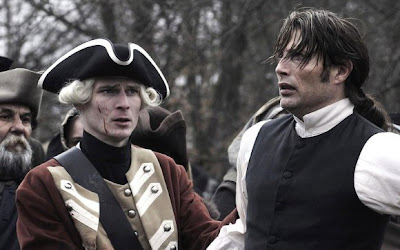Friday, 17 February 2012
'A Royal Affair' Berlinale (Competition) review:
An epic tale of romance, ambition and the tragic fallibility of idealism, 'A Royal Affair' (or 'En Kongelig Affære') is a historical drama recounting the story of how provincial German physician and amateur philosopher Johan Struensee (Mads Mikkelsen) became the power behind the Kingdom of Denmark - for a brief time transforming one of Europe's most backwards feudal powers into a progressive model of the enlightenment that pre-dated the French Revolution by several decades.
After being appointed the personal physician to Christian VII (a frequently hilarious, scene-stealing performance from Mikkel Boe Følsgaard) in 1768, Struensee used his close friendship with the mentally unwell monarch to banish the country's conservative ruling council and institute a bold raft of social changes which included ending censorship, vaccinating common people against smallpox and abolishing torture. Pretty soon he was actually signing new laws himself, without need of the king's signature. However the old ruling elites, stripped of much of their power, used the newly free press to make Struensee deeply unpopular with the people - enabling his overthrow and eventual beheading.
The key to undermining his popularity - at least according to director Nikolaj Arcel's splendid film - lay in publicising details of his passionate, doomed affair with Christian's estranged wife, the English-born Queen Caroline Mathilde (rising Swedish actress Alicia Vikander). Though they begin this romance very quietly, the two are soon madly in love and even have a daughter (officially Christian's), with their passion an open secret at the palace. A few lurid details later, and with fabricated talk of Struensee poisoning the king to steal power, the people are baying for blood and aching to restore the old order - founded on religion over reason.
The power of the yellow press to turn a mob against its own interests is just one of many potent themes, as is the battle between progress and traditionalism - and that between the wealthy and the poor. But also visible here is something of how power corrupts, for instance as Stuensee brings back censorship when he is the target of criticism. There is also some truth to the idea that he is taking advantage of this mentally ill king, with his use of the ruler as a puppet in no way dissimilar from that of the previous council. Do his good intentions excuse his behaviour in this regard? I'm not sure.
As he faces the block, the doctor - who has already signed a letter condemning enlightenment ideals in the hope of a pardon - looks out onto the crowd in their thousands who have come to cheer his death, and is stunned about where his determination to improve their lot has landed him. Perhaps he moved too fast or gave "the people" too much credit. In any case even if his optimism about the human condition seems to be placed in doubt, the film is not itself given to pessimism: merely the cruel irony of fate.
Everything about 'A Royal Affair' is stunning. Its ambitious scope in terms of subject matter, its intelligence, its brilliant cast of actors (I'll now happily watch anything with Alicia Vikander in it), and its lavish production values. I cried at the end, with the once vital Caroline separated from her children and living in exile, and I laughed far more and far harder than I have at the last dozen or so comedies. The story of a doctor who gives a king new confidence and inspires him to greater things, it could easily be billed as Denmark's answer to 'The King's Speech'. It's far better than that.
Subscribe to:
Post Comments (Atom)



Trailer og anmeldelser af filmen 'En kongelig affære', en romantisk film med bl.a. Mads Mikkelsen og Alicia Vikander, instrueret af Nicolaj Arcel.
ReplyDeleteHaving read this review I thought that some readers might wish to dance along in the rococo footsteps of Caroline Mathilde – get the ideas for a visit to Copenhagen and experience where she lived her life at http://www.europeanhistories.com/royal-affair
ReplyDeleteAn interesting detail in the film is the use of the exclusuve tableware "flora danica".
ReplyDeleteSorry to say, but the Royal Danish Porcelain Factory had not finished the planned gift for the russian empress Katarina the great till much later...